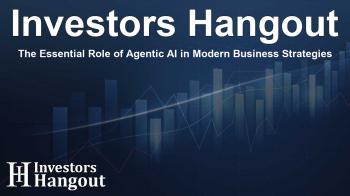The Essential Role of Agentic AI in Modern Business Strategies

Agentic AI: A Game Changer for Businesses
The rise of Agentic AI signifies a crucial evolution in how businesses operate today. Recent research indicates that a remarkable 68% of software providers have already integrated agentic AI capabilities into their offerings. This shift is not merely a trend; it is a definitive inflection point for the entire industry. As vendors strive to adapt their architectures and strategies in response to the relentless pace of AI advancements, it's becoming clear that embracing these technologies is essential for ensuring competitive advantage.
Understanding the Impact of Agentic AI Solutions
Agentic AI solutions are designed to generate tangible business outcomes by harmonizing a well-defined business process with large language models (LLMs) and relevant data. This integration enables organizations to execute tasks intelligently—automating processes, making informed decisions, and adjusting in real-time with minimal human oversight. The Dresner Agentic AI Report delves into how organizations perceive and utilize this technology, highlighting its significance alongside other emerging tech trends.
Research Insights into Adoption Patterns
According to the latest research findings, there is a distinct acceleration in user adoption, with approximately 10.5% of surveyed organizations actively experimenting with or deploying agentic AI technologies. An additional 27% are set to follow suit. While a cautious 58% are still observing from the sidelines, the momentum is palpable, with expectations that broader adoption will ensue as early adopters begin to showcase tangible results.
Characteristics of Early Adopters
Notably, only 6.5% of businesses have successfully implemented Agentic AI into their production environments, which is a clear indicator that this technology is advancing beyond theoretical applications. These early adopters share a unique data-centric approach: they typically have achieved previous success in business intelligence initiatives, are enthusiastic about machine learning, and more than half have appointed a dedicated data leader within their organizations. This trend emphasizes that successful operationalization of Agentic AI often hinges on a mature data infrastructure.
Strategic Priorities for the Future
Industry experts suggest that the motivations driving the adoption of agentic AI technologies extend beyond mere experimentation. Two-thirds of the stakeholders surveyed cite market differentiation, customer demand, and competitive pressure as primary motivations. This growing urgency reflects the understanding that masterful integration of AI capabilities is vital for remaining relevant as technological landscapes evolve.
Authorities Weigh In
Howard Dresner, the founder and chief research officer at Dresner Advisory, emphasizes the importance of providing data-driven insights to empower organizations in navigating these transitions. As he notes, this new report from Dresner Advisory Services strives to illuminate not just the adoption trends but also the success factors and organizational traits associated with beneficial outcomes from agentic AI initiatives.
The Future of AI in Business
Myles Suer, research director at Dresner Advisory, points out that agentic AI has transitioned from a realm of experimental innovation into a strategic necessity. As companies begin to realize the potential of these technologies, significant investments are made across the market, reflecting both opportunity and increased urgency in adopting AI strategies.
Conclusion: Preparing for an AI-Driven Tomorrow
The Insights gained from the Wisdom of Crowds research offer invaluable perspectives on the current state of agentic AI, revealing the landscape of usage and deployment trends, product offerings, and market perceptions. It's clear that the integration of Agentic AI is not just a passing phase but rather a fundamental transformation that organizations must embrace to thrive in an increasingly competitive environment.
Frequently Asked Questions
What is Agentic AI?
Agentic AI refers to a category of artificial intelligence that automates tasks, makes decisions, and adapts in real-time with minimal human intervention.
Why is Agentic AI important for businesses?
It helps businesses improve efficiency and responsiveness, ensuring they remain competitive by leveraging data and AI capabilities.
What motivates companies to adopt Agentic AI?
Companies are motivated by the need for market differentiation, customer demands, and competitive pressures to enhance their operational capabilities.
How many organizations are currently utilizing Agentic AI?
About 10.5% of organizations are currently experimenting with or deploying agentic AI, with more expected to follow.
What are the characteristics of firms successfully implementing Agentic AI?
The successful firms typically have a strong track record in business intelligence, appreciate machine learning, and often have a dedicated data leadership team.
About The Author
Contact Henry Turner privately here. Or send an email with ATTN: Henry Turner as the subject to contact@investorshangout.com.
About Investors Hangout
Investors Hangout is a leading online stock forum for financial discussion and learning, offering a wide range of free tools and resources. It draws in traders of all levels, who exchange market knowledge, investigate trading tactics, and keep an eye on industry developments in real time. Featuring financial articles, stock message boards, quotes, charts, company profiles, and live news updates. Through cooperative learning and a wealth of informational resources, it helps users from novices creating their first portfolios to experts honing their techniques. Join Investors Hangout today: https://investorshangout.com/
The content of this article is based on factual, publicly available information and does not represent legal, financial, or investment advice. Investors Hangout does not offer financial advice, and the author is not a licensed financial advisor. Consult a qualified advisor before making any financial or investment decisions based on this article. This article should not be considered advice to purchase, sell, or hold any securities or other investments. If any of the material provided here is inaccurate, please contact us for corrections.

